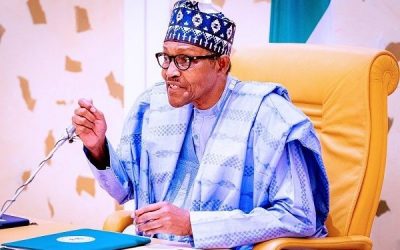Buhari projects N900b for subsidy in 2022
She dropped the hint at the presentation of the Medium-Term Expenditure Framework/Fiscal Strategy Paper for 2022-2024 in Abuja.
Explaining the subsidy conundrum that the country has found itself, Ahmed lamented that “petroleum subsidy is costing us big time. We have a situation where subsidy cost, N150 billion in a particular month.
“That means NNPC has to use that amount of money to pay for PMS and distribute it. That is money that the federation account can share. This is money that could have been available for education, health and infrastructure”.
She said that a break from subsidy payment “will reduce our borrowing, and increase the amounts that states and local governments are collecting from the Federation Account Allocation Committee (FAAC)”.
With the current subsidy regime payouts, Ahmed said: “We are being penny-wise, pounds foolish to think that by giving this subsidy, citizens are benefitting. But at the end of the day, the citizens are actually the ones that are carrying the brunt of the wealthy.
“Some have two, three, four cars and they are the ones that we are subsidising. It is not helping the farmer who needs a bus from his farm to the market. But if we get rid of subsidy completely, it will not be a popular view with labour.
“Right now, we are subsidising consumption; we sell at N165, per liter when our neighbours are selling at N500 per litre. It is only the marketers that are benefiting by taking this product from Nigeria and selling it across the borders. The common man is not benefiting.
“The transition to a non-subsidy regime is not an easy one if we have to remove the subsidy. What are the alternatives? What can we provide for the citizens? So, we are projecting if we’ll be paying at least N900 billion subsidy for next year.
“What we could have done with that amount; how many schools you can build and how many health centers. It is not wise because we are hurting our economy.”
She disclosed that the Federal Government plans to spend N13.98 trillion in the 2022 fiscal year, pointing out that the capital expenditure will be slashed to N3.61 trillion as against this year’s N4.37 trillion vote.
The 2022 proposed spending shows that the N13.98 trillion represents an increase over the N13.58 trillion approved in the 2021 budget.
A breakdown of the expenditure also showed that debt service is expected to gulp N3.6 trillion in 2022 as against N3.12 trillion in 2021, while non-debt recurrent expenditure is projected at N6.2 trillion in 2022 as against N5.64 trillion in the 2021 Appropriation Act.
On the revenue side, the government plans to generate N8.35 trillion nest year as against the N7.98 trillion this year.
The government’s share of oil revenue is N3.1 trillion in 2022, N4.4 trillion in 2023 and N4.1 trillion in 2024. Share of federal government’s dividend (NLNG) is put at N184 billion in 2022 while share of minerals and mining is N2.9 trillion and expected revenue from Government Owned Enterprises (GOEs) in 2022 is put at N2 trillion.
The minister said the budget would be prepared based on an oil production volume of 1.88 million barrels per day with a benchmark oil price of $57 per barrel at an exchange rate of N410.15 to a dollar, projected inflation rate of 13 percent and GDP growth of 4.20 per cent.
The minister said: “From next year, federal government will securitize it’s borrowings from the Central Bank of Nigeria (CBN). By law government is expected to borrow not more than five percent of its revenue but it appears the government has borrowed well above what it is required to borrow that is why it wants to securitize its borrowings from the CBN.
“The federal government will stay within the five per cent limit provided by the CBN Act and the Fiscal Responsibility Act.
Regarding the implementation of the 2021 Budget, finance minister Ahmed denied allegations that government was not fully implementing the budget. She said government has released funds for both capital (N973 billion) and recurrent, faulting insinuation that, funds were not being released for capital projects.
“The preparation of the budget estimates for Ministries, Departments and Agencies (MDAs) usually take into consideration the Medium Term Policies/Strategies contained in the Expenditure Framework and Fiscal Strategy Paper which is the Federal Government’s pre-budget statement.”


